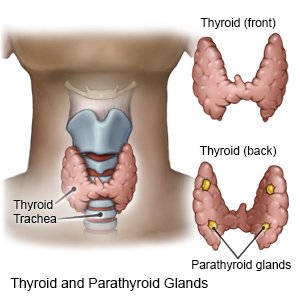Partial Thyroidectomy
Medically reviewed by Drugs.com. Last updated on Apr 6, 2025.
A partial thyroidectomy is surgery to remove part of your thyroid gland. You may have a sore throat, hoarse voice, or difficulty swallowing after surgery. It is normal to have these problems for up to 6 months after surgery.
 |
DISCHARGE INSTRUCTIONS:
Call your local emergency number (911 in the US), or have someone call if:
- You have sudden swelling in your neck or trouble swallowing.
- You have trouble breathing.
- You have a seizure.
Seek care immediately if:
- Your arm or leg feels warm, tender, and painful. It may look swollen and red.
- Blood soaks through your bandage.
- Your stitches come apart.
- Your incision is red, swollen, or draining pus.
- You suddenly feel lightheaded and short of breath.
- You have chest pain when you take a deep breath or cough, or you cough up blood.
- You have sudden tingling or muscle cramps in your face, arm, or leg.
- You have muscle spasms in your legs and feet that do not go away.
Call your endocrinologist or surgeon if:
- You have a fever or chills.
- You feel very tired and cold, gain weight for no reason, and your skin is very dry.
- You vomit several times in a row.
- You have new voice weakness or hoarseness, or it is getting worse.
- You have questions or concerns about your condition or care.
Drugs used to treat this and similar conditions
ThyroShield
ThyroShield is used for cough, cutaneous sporotrichosis, hyperthyroidism, radiation emergency
Ozempic
Learn about Ozempic (semaglutide) for type 2 diabetes treatment, weight management, cardiovascular ...
Hicon
Hicon is used for diagnosis and investigation, hyperthyroidism, thyroid cancer
Sodium iodide-i-131
Sodium iodide-i-131 systemic is used for diagnosis and investigation, hyperthyroidism, thyroid cancer
Iodine/potassium iodide
Iodine/potassium iodide systemic is used for hyperthyroidism
Potassium iodide
Potassium iodide systemic is used for cough, cutaneous sporotrichosis, hyperthyroidism, radiation ...
Medicines:
You may need any of the following:
- Prescription pain medicine may be given. Ask your healthcare provider how to take this medicine safely. Some prescription pain medicines contain acetaminophen. Do not take other medicines that contain acetaminophen without talking to your healthcare provider. Too much acetaminophen may cause liver damage. Prescription pain medicine may cause constipation. Ask your healthcare provider how to prevent or treat constipation.
- Thyroid medicine may be needed daily to keep your thyroid hormone level steady.
- Take your medicine as directed. Contact your healthcare provider if you think your medicine is not helping or if you have side effects. Tell your provider if you are allergic to any medicine. Keep a list of the medicines, vitamins, and herbs you take. Include the amounts, and when and why you take them. Bring the list or the pill bottles to follow-up visits. Carry your medicine list with you in case of an emergency.
Incision site care:
Check the incision site every day for signs of infection, such as redness, swelling, or pus. Carefully wash your skin near the incision site with soap and water. Dry the area and put on new, clean bandages as directed. Change your bandages when they get wet or dirty.
Self-care:
- Follow activity instructions. Do not lift anything heavier than 10 pounds or do vigorous activities. Do not drive until your surgeon says it is okay. These actions will put too much stress on your incision. Ask your surgeon which activities are safe for you. Also ask when you can return to your usual activities such as work or school.
- Ask your healthcare provider about supplements. Your provider will tell you if you need to take calcium or vitamin D, and how much to take.
Follow up with your endocrinologist or surgeon as directed:
You will need to return to have your incision site checked and stitches removed. You may also need blood tests to monitor your calcium, parathyroid, and thyroid hormone levels. Write down your questions so you remember to ask them during your visits.
© Copyright Merative 2025 Information is for End User's use only and may not be sold, redistributed or otherwise used for commercial purposes.
The above information is an educational aid only. It is not intended as medical advice for individual conditions or treatments. Talk to your doctor, nurse or pharmacist before following any medical regimen to see if it is safe and effective for you.
Further information
Always consult your healthcare provider to ensure the information displayed on this page applies to your personal circumstances.
